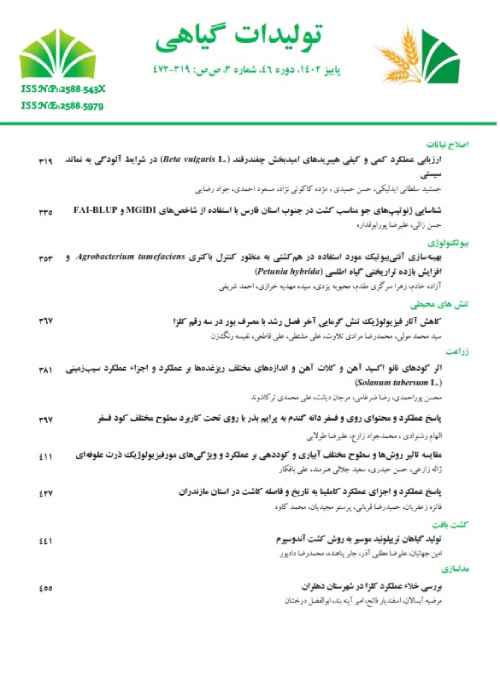Allelopathic Effect of Aqueous and Methanol Extract of Ferula Foetida on Tomato (Lycopersicun escolentum) Seed Germination
Author(s):
Abstract:
Background And Objectives
Allelopaty is regarded as a natural protecting strategy involving plant secoundary metabolites that influence the growth and development of surrounding biological system. Determining the mode of action of secondary metabolites as allelochemicals is one of the challenging aspects in allelopathic research. Today, allelochemicals have been proposed to cause oxidative stress in some of neighbor plants and inhibited their cell proliferation; however, its mechanism of action remains unexplored. The aim of the present study was to investigate the phytotoxic effect of leaf aqueous and methanol extract of Ferula foetida on physiological and biochemical processes during germination of tomato seeds.Material and
Methods
Effects of allelochemicals extracted from Ferula foetida on tomato (Lycopersicun escolentum) seed germination were investigated. For these purposes, a factorial experiment was conducted in a completely randomized design with four replications in plant physiology laboratory of Islamic Azad University, Neyshabur Branch. The first factor included allelopatic materials in three levels including 10% aqueous and methanolic extract of Ferula foetida(gathered in early vegetative growth period), and control and the second factor was time of sampling in 5 levels including sampling in 24,48,72,96 and 120 hours after imbibition.Results
The results showed that tomato seed viability, Malondialdehyde (MDA) content, hydrogen peroxide and antioxidative enzyme activity such as Superoxide dismutase (SOD), Catalase (CAT), Ascorbate peroxidase (APX) and Polyphenol oxidase (PPO) were significantly affected by treatment. In the earliest time of imbibition, both aqueous and methanol extracts, the activity of APX of tomato seed was the lowest, while the PPO showed the highest activity. The highest loss of seed viability, H2O2 and MDA, was in the seed treated with aqueous extract after 120 h, and the highest activity of antioxidative enzymes was in 72 h after exposure to water extract phytotoxins.Discussions
Our results showed that despite the activation of the antioxidant system by Ferula foetida phytotoxic, reactive oxygen species accumulation caused cellular damage which resulted in decrease of gradual loss of tomatos seed viability. In addition, this study demonstrated that aqueus and alcholic extraction materials from Ferula foetida exhibited cosiderable allelochemical potential. Therfore, this compound could be utilized to generate a new generation of herbicidees that are more ecologically friendly. Keywords:
Language:
Persian
Published:
Plant Production, Volume:39 Issue: 3, 2016
Pages:
65 to 76
magiran.com/p1611154
دانلود و مطالعه متن این مقاله با یکی از روشهای زیر امکان پذیر است:
اشتراک شخصی
با عضویت و پرداخت آنلاین حق اشتراک یکساله به مبلغ 1,390,000ريال میتوانید 70 عنوان مطلب دانلود کنید!
اشتراک سازمانی
به کتابخانه دانشگاه یا محل کار خود پیشنهاد کنید تا اشتراک سازمانی این پایگاه را برای دسترسی نامحدود همه کاربران به متن مطالب تهیه نمایند!
توجه!
- حق عضویت دریافتی صرف حمایت از نشریات عضو و نگهداری، تکمیل و توسعه مگیران میشود.
- پرداخت حق اشتراک و دانلود مقالات اجازه بازنشر آن در سایر رسانههای چاپی و دیجیتال را به کاربر نمیدهد.
In order to view content subscription is required
Personal subscription
Subscribe magiran.com for 70 € euros via PayPal and download 70 articles during a year.
Organization subscription
Please contact us to subscribe your university or library for unlimited access!


